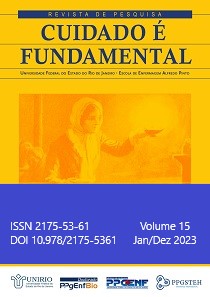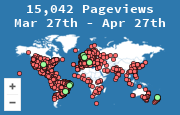WORKING CONDITIONS AND DEPRESSIVE SYMPTOMATOLOGY IN INTENSIVE CARE NURSES DURING THE COVID-19 PANDEMIC
DOI:
https://doi.org/10.9789/2175-5361.rpcfo.v15.12757Keywords:
Depression, Occupational health, Intensive care units, Work conditions, COVID-19Abstract
Objective: to analyze working conditions associated with depressive symptoms in intensive care nurses during the COVID-19 pandemic. Method: qualitative research, content analysis; with nurses from ICUs at a hospital in São Paulo/SP; semi-structured questionnaire interview. Results: 68 participants from 9 ICUs, mostly female, 28-45 years old; time since graduation, institution working, insitution ICU experience and ICU nursing experience between 1-8 years; without other job; weekly workload 38 - 60 h -more; 10 with previous depression diagnosis, 16 with mild, moderate depression. Working conditions related to depressive symptoms: overload due to workload intensity and emergency admission of untrained professionals to the ICU; absent boss; uninterested colleagues; impotence/suffering by patients, deaths; material shortfall; infecting family members fear; family discrimination for being on the front lines; afraid to get infected. Negative influence on the assistance provided. Final considerations: depressive symptoms associated with inadequate working conditions in ICUs, aggravated by the COVID-19 pandemic.
Downloads
References
PAHO. The COVID-19 health care workers study (HEROES): Informe regional de las Américas [Internet]. WASHINGTON, D.C: Organização Pan-Americana da Saúde; 2022 [cited 2022 Nov 1]. Available from: https://iris.paho.org/bitstream/handle/10665.2/55563/OPSNMHMHCOVID-19220001_spa.pdf?sequence=1&isAllowed=y.
Osório FL, Silveira ILM, Pereira-Lima K, Crippa JAS, Hallak JEC, Zuardi AW, et al. Risk and protective factors for the mental health of brazilian healthcare workers in the frontline of COVID-19 pandemic. Front psyc. [Internet]. 2021 [cited 2022 sep 10];12. Available from: https://doi.org/10.3389/fpsyt.2021.662742.
Varghese A, George G, Kondaguli SV, Naser AY, Khakha DC, Chatterji R. Decline in the mental health of nurses across the globe during COVID-19: A systematic review and meta-analysis. J. glob health. [Internet]. 2021 [cited 2022 sep 24];11:05009. Available from: https://doi.org/10.7189/jogh.11.05009.
Bergman L, Falk AC, Wolf A, Larsson IM. Registered nurses‘ experiences of working in the intensive care unit during the COVID-19 pandemic. Nurs. crit. care. [Internet]. 2021 [cited 2022 sep 22];26(6). Available from: https://doi.org/10.1111/nicc.12649.
Bardin L. Análise de conteúdo. Lisboa: Edições 70, 5 ed rev. Ampliada, 2018.
Fiocruz/COFEN. Perfil da enfermagem no Brasil: relatório final [Internet]. Rio de Janeiro; 2017 [acesso em 10 de setembro 2022]. Disponível em: http://www.cofen.gov.br/perfilenfermagem/pdfs/relatoriofinal.pdf.
Shalaby SA, Janbi NF, Mohammed KK, Al-harthi KM. Assessing the caring behaviors of critical care nurses. J. nurs. educ. Pract. [Internet]. 2018 [cited 2022 sep 7];8(10). Available from: https://doi.org/10.5430/jnep.v8n10p77.
Wihardja H, Hariyati TS, Gayatri D. Analysis of factors related to the mental workload of nurses during interaction through nursing care in the intensive care unit. Enferm. Clin. [Internet]. 2019 [cited 2022 sep 7];29(Suppl2). Available from: https://doi.org/10.1016/j.enfcli.2019.06.002.
Preti E, Mattei V, Perego G, Ferrari F, Mazzetti M, Taranto P, et al. The psychological impact of epidemic and pandemic outbreaks on healthcare workers: rapid review of the evidence. Curr. psychiatry rep. [Internet]. 2020 [cited 2022 oct 23];22(8). Available from: https://doi.org/10.1007/s11920-020-01166-z.
Ohue T, Togo E, Ohue Y, Mitoku K. Mental health of nurses involved with COVID-19 patients in Japan, intention to resign, and influencing factors. Medicinen [Internet]. 2021 [cited 2022 nov 30];100(31):e26828. Available from: https://doi.org/10.1097/MD.0000000000026828.
El-Hage W, Hingray C, Lemogne C, Yrondi A, Brunault P, Bienvenu T, et al. Health professionals facing the coronavirus disease 2019 (COVID-19) pandemic: What are the mental health risks?. L’Encéphale. [Internet]. 2020 [cited 2022 aug 27];46(3). Available from: https://doi.org/10.1016/j.encep.2020.04.008.
Ariapooran S, Ahadi B, Khezeli M. Depression, anxiety, and suicidal ideation in nurses with and without symptoms of secondary traumatic stress during the COVID-19 outbreak. Arch. psychiatr. nurs. [Internet]. 2022 [cited 2022 nov 6];37. Available from: https://doi.org/10.1016/j.apnu.2021.05.005.
Oliveira OC, Soares PJR. O impacto da pandemia de COVID-19 na saúde mental das equipes de enfermagem no Brasil e o enfrentamento frente a este desafio: revisão integrativa. RUNA. [Internet]. 2021 [acesso em 25 de setembro 2022]; Disponível em: https://repositorio.animaeducacao.com.br/handle/ANIMA/14866.
Sun N, Wei L, Shi S, Jiao D, Song R, Ma L, et al. A qualitative study on the psychological experience of caregivers of COVID-19 patients. Am. j. infect. control. [Internet]. 2020 [cited 2022 aug 20];48(6). Available from: https://doi.org/10.1016%2Fj.ajic.2020.03.018.
Lewis S, Willis K, Bismark M, Smallwood N. A time for self-care? frontline health workers’ strategies for managing mental health during the COVID-19 pandemic. SSM - Mental health. [Internet]. 2022 Dec [cited 2022 aug 27];2. Available from: https://doi.org/10.1016/j.ssmmh.2021.100053.
Fernández-Castillo RJ, González-Caro MD, Fernández-García E, Porcel-Gálvez AM, Garnacho-Montero J. Intensive care nurses' experiences during the COVID-19 pandemic: a qualitative study. Nurs. crit. care. [Internet]. 2021 [cited 2022 sep 3];26(5). Available from: https://doi.org/10.1111/nicc.12589.
Willis K, Ezer P, Lewis S, Bismark M, Smallwood N. “Covid just amplified the cracks of the system”: working as a frontline health worker during the COVID-19 pandemic. Int. j. environ. res. public health (Online). [Internet]. 2021 [cited 2022 aug 21];18(19). Available from: https://doi.org/10.3390/ijerph181910178.
Lin YP, Tang CJ, Tamin VA, Tan LYC, Chan EY. The hand-brain-heart connection: ICU nurses' experience of managing patient safety during COVID-19. Nurs. crit. care. [Internet]. 2022 [cited 2022 nov 3];27(5). Available from: https://pubmed.ncbi.nlm.nih.gov/34472664/.
Rhéaume A, Breau M, Boudreau S. A critical incident study of ICU nurses during the COVID-19 pandemic. Nurs. ethics. [Internet]. 2022 [cited 2022 aug 27];29(2). Available from: https://doi.org/10.1177/09697330211043270.
Gordon JM, Magbee T, Yoder LH. The experiences of critical care nurses caring for patients with COVID-19 during the 2020 pandemic: A qualitative study. Appl. nurs. res. [Internet]. 2021 [cited 2022 oct 30];59:151418. Available from: https://doi.org/10.1016/j.apnr.2021.151418
Hossain F, Clatty A. Self-care strategies in response to nurses’ moral injury during COVID-19 pandemic. Nurs. ethics. [Internet]. 2021 [cited 2022 sep 10];28(1). Available from: https://doi.org/10.1177/0969733020961825.
Guttormson JL, Calkins K, McAndrew N, Fitzgerald J, Losurdo H, Loonsfoot D. Critical care nurses‘experiences during the COVID-19 pandemic: A US national survey. Am. j. crit. care. [Internet]. 2022 [cited 2022 sep 25];31(2). Available from: https://pubmed.ncbi.nlm.nih.gov/34704108/.
Published
How to Cite
Issue
Section
License
Copyright (c) 2023 Revista de Pesquisa Cuidado é Fundamental Online

This work is licensed under a Creative Commons Attribution-NonCommercial-ShareAlike 4.0 International License.
TRANSFER AGREEMENT COPYRIGHT I transfer copyright of the article to the Journal of Care Survey is Fundamental - Online - RPCF, so it is accepted due to electronic publishing. The copyright includes the right to reproduce in whole or in part by any means, distributing that article, including figures, photographs, and any translations. The author can also print and distribute copies of your article, stating that since the rights belong to RPCF. I declare that this manuscript is original and has not been submitted for publication, in whole or in part to other online journals or not, so BMMC in the Annals of scientific events or book chapters.






























